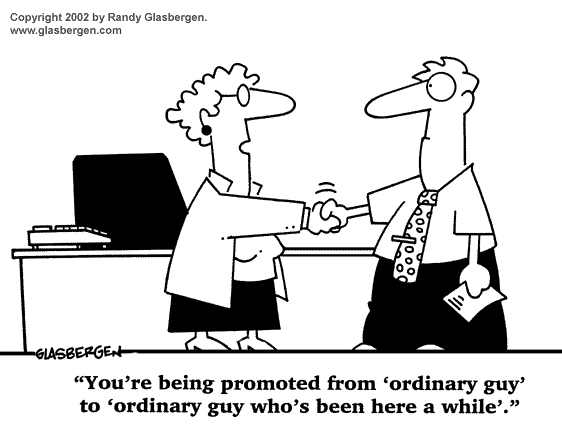
I ended Part I of this series talking about what excellence really is. Often we think of it as hard work and commitment, both of which are noble things. Or we think it comes out of a competitive spirit or extreme natural talent, again not bad things necessarily. They all certainly can put you on the road to "excellence."
But I would propose that excellence is more than that: It is an ability to go beyond the ordinary.
And to do that requires a shift in our typical mindset to fight against natural tendencies (what my grandmother would call "stinking thinking"). I listed these tendencies in Part I, but I will give a short recap here:
- We talk long term, but we think (and act) short term.
- We crave a team, but we like individual prizes too much.
- We need constant positive reinforcement.
- We focus on the wrong things because they look and sound like (or seem like) they are more satisfying than the right things.
- We don't really know what our goals are.
In Part I, I started out by talking about the world of competitive swimming that my young daughter is in. After a couple of years in it, frankly, I still don't understand much about it. It's a confusing environment, and it is a world where you are actually coached to "sweat the small stuff" because technique matters so much.
But from what I've observed, another aspect matters just as much, and that is mindset. So although I can't coach my daughter on her technique, I can coach her on her mindset, a mindset that if she can learn to shift now, she can use when she enters the rat race, an even more confusing environment.
Here are some things we've been discussing (to be continued in Part III):
A. Focus more on legacy than on long term or short term.
When you're 10, like my daughter, long term is 6 months from now or maybe next year. And although I hear a lot of talk (both in swimming and in the professional realm) about setting short- and long-term goals, I've encouraged her first to think more in terms of "legacy" when it comes to her involvement in swimming (or other things). Why do you do what you do in the first place? What mark, however small and however brief, do you hope to make on it?
By using examples from history, she and I have looked at this concept of "legacy building" and what that might mean. Have you ever thought of your career in those terms? What legacy will you be leaving behind?
I find the distinction important because so often we rush to set goals, such as a new title or new pay rate or new venture, both long- and short-term ones, but we often set them merely as wish lists, not from a foundation of what we think our legacy should be. Doing so first helps then drive the goals with a purpose. It also helps when we don't reach one of the goals or it takes longer than expected. We still have our purpose behind it.
Legacies are also what make us unique, by the way. Lots of us can have the same job or same lot in life, but we are still each uniquely made and we bring that "gift" to our careers.
B. Cut out the noise and seek wisdom.
Here's a tough one, especially in today's world. We have a lot of different voices coming at us, telling us that we better do this and that or we'll miss the boat and be left behind! So we tend to find ourselves chasing after this thing or that thing. As parents, we do this with our children all the time. We just want to make sure they have the best, so we spend a lot of time getting them "positioned" well with the "right" classes and the "right" activities at the "right" places.
In our careers, we do the same things even though we might not be as aware of it. We get nervous about missing out, or about becoming a victim of the market, so we keep trying to maneuver into the "right" position. And although strategic positioning makes sense, we need some real wisdom behind it first; otherwise, we are really just following the masses.
Extraordinary thinking reminds us that we can't always trust our senses, especially what we see and hear. It tells us we can't give in to scare tactics.
Ordinary thinking says that perception is reality. Extraordinary thinking is thankful that's not true.
(Stay tuned for Part III, where we look at dealing with unfairness and time and chance
No comments:
Post a Comment